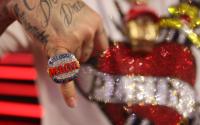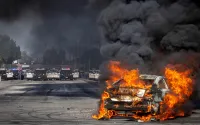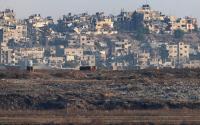21 November 2004
This is a momentous time for the US marines in Iraq. Their story here is intrinsically linked to the story of Fallujah, and the fallout from what is happening there will shape what happens to this country in the days to come.
One of the seminal moments in the assault on the rebel stronghold was the shooting by a US marine of a wounded prisoner in a mosque. It is likely to become one of the enduring images of the conflict, much the way the shooting of a Viet Cong prisoner by a South Vietnamese officer became during that war.
The killing, captured on television, has been played over and over internationally, and nowhere more so than in Iraq, with Americans, British and Iraqis all saying it has brought back bitter and barely healed memories of the infamous Abu Ghraib scandal. The International Red Cross yesterday highlighted the mosque shooting and the murder of the kidnapped aid worker, Margaret Hassan, as signs of how "basic tenets of humanity" have unravelled in Iraq.
The US marines have also played a key part in the events which has made the struggle for Fallujah so symbolic. Last April, after a mob had lynched four American security guards, the White House and Donald Rumsfeld, the US Defence Secretary, ordered the city to be invested. The then commander of the marines, General James T Conway, advised strongly against this, pointing out that an attack would look like pure revenge and destroy relations he and his men were trying to build with the people of Fallujah through reconstruction projects.
The general's protestations were ignored. But within days, with graphic pictures and accounts of death and devastation in the media, inter- national condemnation, and a jittery Tony Blair urging caution on George Bush, the assault was halted and the marines withdrew.
The attack, which had left 600 Iraqis dead, triggered the rebellion that has swept through the country since. The American retreat was also a huge propaganda triumph for the insurgents, and for the next six months Fallujah became their national headquarters as well as the base of the murderous Abu Musab al-Zarqawi. Mortar and rocket attacks were planned there, and waves of car bombers sent to the rest of the country, especially the capital, Baghdad.
With Fallujah "pacified", the US marines are now engaged in a bloody, and largely unreported, struggle in what is the new heartland of the militants in Babil, south of Baghdad - the so called "triangle of death". Zarqawi is believed to have taken refuge from Fallujah here, and the scale of action, as well as the body count, is far higher than anything taking place in Mosul or elsewhere in Iraq.
The operation is by the 24th Marine Expeditionary Unit (MEU), with the Black Watch battlegroup playing an essentially defensive, blocking role. The British deployment has, of course, been hugely controversial in Britain, and Downing Street, we are told, has attempted to impose an information straitjacket. Reports of soldiers openly declaring that they did not want to deploy to this new area, calling Tony Blair a liar, and the leak of an email in which the commander, Col James Cowan, himself appeared to question the mission, created a fractious atmosphere in which there have been several bruising encounters between journalists and the military.
At the Black Watch base, Camp Dogwood, the media are essentially corralled into a room and a tent, with no access to the rest of the base. Interviewees are brought over to the tent by arrangement, and press officers sit in during the interviews.
At the marines' base, Camp Kalsu, Colonel Ron Johnson, 48, the commander of the 24th MEU, had very different ideas. "You can go and talk to anyone in this base," he declared. "They may say to you they hate Iraqis, they may say to you this is an unjust war. I'll accept that. But if anyone says 'no comment' let me have his name. Iraq is too important for people to come and serve here and not have any views."
Major General Bill Rollo, the British commander in Basra, came in for a flying visit, and Col Johnson invited me to sit in at their meeting. "After all, you represent a British newspaper, it'll be useful." I pointed out it was highly unlikely that the British military would agree to anything like that, and, of course, that turned out to be the case. The colonel's own meetings with his staff remained open.
Col Johnson, a big, cigar-chomping man with a resemblance to Robert De Niro, looks straight out of central casting. He has a reputation of being tough, but seems popular among his men - "a marine's marine," said a sergeant. "He is prepared to take the same risks as you are, he will stand up for you, and he doesn't give you bullshit. Believe me, these qualities can be pretty rare in officers."
The colonel, who comes from Duxbury, Massachusetts and is married with a 12-year-old daughter, has some surprising views. The United Nations sanctions on Iraq, he feels, harmed ordinary people far more than it did the regime. He was not convinced by the claims made about Iraq's supposed weapons of mass destruction, although he insists that it was worth having the war to free the people of Iraq from Saddam Hussein's brutal dictatorship.
He also eschews terms like "terrorists" because they are "too simplistic". In many cases, he holds, impoverished Iraqis are joining the insurgents because the occupying powers have failed to provide them with jobs and means of earning a livelihood.
The colonel talked about TE Lawrence - "Lawrence of Arabia" - and his Seven Pillars of Wisdom. There is, he says, a void in the US military's knowledge of the Arab world. He would like to take his staff officers on courses to study the language and culture. But, unfortunately, "wars keep getting in the way".
The abuse of prisoners at Abu Ghraib, said Col Johnson "was an appalling, disgusting thing. No one should attempt to justify it. It led to a lot of anger among the Iraqi people, and who can blame them? We have got our own detention centre here, and I have made sure that nothing like Abu Ghraib will ever happen here. I want the Red Cross and human rights groups to carry out snap inspections here. I want the media to go and also see for themselves. I think all this will be beneficial, it'll keep us on our toes."
Lt Col Robert l'Abriola, in charge of the detention centre, said air-conditioning was put into the cells, on Col Johnson's instructions, before much of the rest of the camp. The prisoners get the same food as the marines, with adjustments made for religious reasons. The rules also stipulate that the guards must account for every hour of their duty. "The prisoners are treated according to regulations laid down," said Lt Col l'Abriola. "I try to apply the rules of the Geneva Convention as far as possible."
There is, however, an acceptance that the footage of the shooting of the prisoner in the mosque will lead to adverse publicity, and there will be a linkage to Abu Ghraib. Did Col Johnson think the two are comparable? This is an uncomfortable matter for him and other marines. There is a desire for solidarity, especially at a time when they are facing action every day.
"There will be an inquiry, and if there is evidence the guy will be charged," he said finally. "But I do think there are differences. Abu Ghraib was premeditated and organised. Here something happened in the heat of a conflict. This guy had been shot himself the previous day, and they had come across booby-trapped bodies.
"I am not condoning what happened, but these are things that will have to be taken into consideration in anything that follows. The big problem is the effect on the Iraqi people. We have been making progress since Abu Ghraib, now we have just slid a hell of a long way back."
There is, predictably, sympathy for the marine who carried out the shooting among his comrades. But it is not universal. "I hear people saying things like the other side would have done the same, and much worse. But aren't we saying we are better than the other side?" asked a young lieutenant in the huge, hangar-like canteen at Camp Kalsu. " If we are going to say that, then we have got to be accountable, there is no getting away from that. I am glad the TV camera was there - hopefully what was shown will prevent something similar happening in the future."
Unlike some other American and British officers, who privately speak about the interim Iraqi government's security forces with disdain, Col Johnson displays an almost messianic zeal in his support of them. "These guys are leading far more dangerous lives than the rest of us," he said. "When they are captured, they are killed, sometimes after torture. Their families have been murdered as well. I think it takes a hell of a lot of guts under these circumstances to do what they do.
"The bottom line is that Iraqis must be allowed to run their own country. This is a country with history and culture and education. They are good workers. It is patronising of Westerners who say somehow that Iraqis cannot cope.
"This brings me to the question I keep on asking, but never get a satisfactory answer. What happened to the $18bn that Congress voted for reconstruction ? Why are so many contracts going to American and other foreign firms? Why aren't they going to more Iraqis? Who's deciding all this?"
At Mahmudiya, where the 2nd Battalion are based, the marines are very much in the front line of the current operation. There are daily and, at times, fierce clashes with insurgents. The commanding officer, Lt Col Mark Smith, had just returned from an all-night operation and still had his camouflage "war paint" on. The raid, on a farm, followed information that Zarqawi was hiding there. They did not find him, but, he said, they caught two senior members of the insurgency.
"We have had lots of engagements and we have killed lots," he said. "With Fallujah over, the action has moved here. The people we are killing are Zarqawi's, and, let me tell you, I don't mind killing beheaders at all. Hell, if Zarqawi wants to have a knife fight with me, one to one, I'd be happy to oblige."
Conversations over dinner of chicken and mashed potatoes moved on to politics. The debate was whether there would ever be peace in Iraq and the rest of the Middle East as long as the Palestine dispute remains unsolved. One officer storms off, saying: "It seems to me that Israel can do whatever it wants and then come up with some bullshit excuse, and then the rest of us have to pick up the pieces elsewhere." Another officer shrugged: "We are the marines, not the army, so we encourage debate. But it's best not to do it over dinner, you only get indigestion."
A raid took place on Mahmudiya in a hunt for targeted suspects, arms and distribution centres for insurgent literature. Nine men were arrested, and guns and ammunition, including a Dragonov sniper's rifle, taken from two shops which had allegedly been supplying militant factions.
Large crowds gathered as roads were sealed off, the mood unhappy but resigned. There were only two interpreters, and they were both busy in another location. One of the officers shook his head in exasperation "I can't talk to these people. That is the biggest problem, we can't communicate." He asked me whether I could go and buy some pastries for him and his men from a bakery. Wouldn't it be better if he came along as well and actually met the people in the shop, I asked. In an ideal world, he said, but it is considered just too dangerous here.
In the shop people said they had no idea what the Americans were after, the reason for the disruption of their lives. "They do not really talk to us," said the shopkeeper. "I did not even know they liked our food."
He refused to take money for the pastries. The marines were getting increasingly apprehensive. The longer we stayed on the streets, the more the chance of getting hit by mortars and car bombers. There was sporadic gunfire in the background, but no one was quite sure who was firing at whom.
"I keep on thinking in these situations that if I am going to die, I want to savour these last moments, what I see, what I feel," said a young marine. "And right now, I feel I don't really understand these people, and they don't really understand us."






